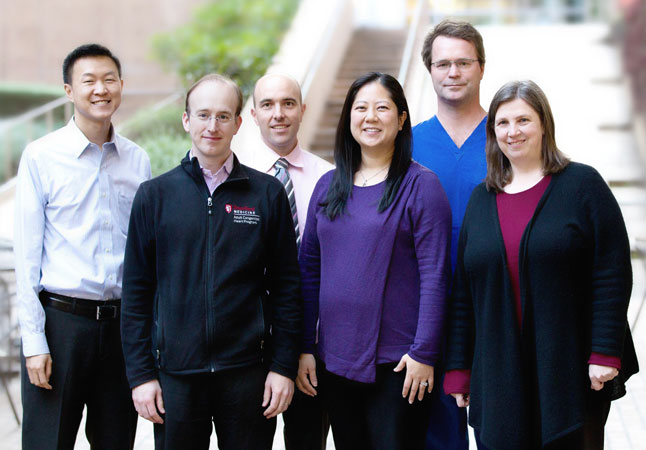Adult Congenital Heart Program at Stanford Offers Unusual Level of Expertise in Caring for Adults Born With Heart Defects
For Release: February 10, 2016
 STANFORD, Calif. — The Adult Congenital Heart Program at Stanford Medicine Children’s Health and Stanford Medicine Health Care now has seven board-certified specialists in adult congenital heart disease, making it one of the largest groups of such doctors in the country. The seven physicians are among the caregivers who passed the first-ever board certification exam in their field, which is newly recognized as a subspecialty by the American Board of Internal Medicine. Results for the October 2015 exam were announced by the board in early January.
STANFORD, Calif. — The Adult Congenital Heart Program at Stanford Medicine Children’s Health and Stanford Medicine Health Care now has seven board-certified specialists in adult congenital heart disease, making it one of the largest groups of such doctors in the country. The seven physicians are among the caregivers who passed the first-ever board certification exam in their field, which is newly recognized as a subspecialty by the American Board of Internal Medicine. Results for the October 2015 exam were announced by the board in early January.
It’s a timely achievement. Although many congenital heart defects were once fatal in childhood, dramatic improvements in surgeons’ ability to repair such defects has increased the number of U.S. adults living with them to more than one million. Yet a successful childhood surgical repair does not cure most congenital heart disease patients, doctors have learned. And congenital defects can interact with cardiovascular problems acquired with age.
“These are patients who need ongoing monitoring and treatment to help them navigate the risks of living with lingering heart problems,” said cardiologist Daniel Murphy, MD, who was instrumental in advocating for the new subspecialty to be formally recognized. The population of adults living with heart defects they were born with is growing by about 20,000 people per year as adolescents graduate to adult care, he noted. And such patients are seeking care at destination programs like Stanford’s.
“This new board certification exam is the result of over a decade of really hard work by leaders in the adult congenital cardiac community,” Murphy said. “It enforces training and knowledge standards that we think these patients have a right to expect when they seek medical care from a specialist.”
The Stanford physicians who obtained their board certification are George Lui, MD, the program’s medical director and a clinical assistant professor of cardiovascular medicine and pediatric cardiology at the Stanford University School of Medicine; Ian Rogers, MD, clinical assistant professor of cardiovascular medicine and pediatric cardiology; Doff McElhinney, MD, professor of cardiothoracic surgery; Anne Dubin, MD, professor of pediatric cardiology; Kara Motonaga, MD, clinical assistant professor of pediatric cardiology; Scott Ceresnak, MD, assistant professor of pediatric cardiology; and Nikola Tede, MD, a pediatric cardiologist who sees patients at California Pacific Medical Center through its alliance with Stanford Medicine Children’s Health.
Stanford’s program, a collaboration between Lucile Packard Children’s Hospital Stanford and Stanford Medicine Health Care, has a long history as a national leader in the care of adult congenital heart patients. “This is a field which requires people to bring a lot of different kinds of skills, experience and knowledge to their interactions with patients,” Murphy said. “I’m really proud of our physicians. Their success validates the training we have here and shows that we’re on the right track for providing care for this important group of patients.”
Related Links
* Read about Christy Sillman, RN, who brings extraordinary personal experience to her work. Sillman is a nurse coordinator for the program, and has adult congenital heart disease.
* Find out why a 61-year-old man received heart surgery at Lucile Packard Children's Hospital Stanford
Authors
Robert Dicks
(650) 497-8364
rdicks@stanfordchildrens.org
About Stanford Medicine Children's Health
Stanford Medicine Children’s Health, with Lucile Packard Children’s Hospital Stanford at its center, is the Bay Area’s largest health care system exclusively dedicated to children and expectant mothers. Our network of care includes more than 65 locations across Northern California and more than 85 locations in the U.S. Western region. Along with Stanford Health Care and the Stanford School of Medicine, we are part of Stanford Medicine, an ecosystem harnessing the potential of biomedicine through collaborative research, education, and clinical care to improve health outcomes around the world. We are a nonprofit organization committed to supporting the community through meaningful outreach programs and services and providing necessary medical care to families, regardless of their ability to pay. Discover more at stanfordchildrens.org.
Connect with us:
Download our App: